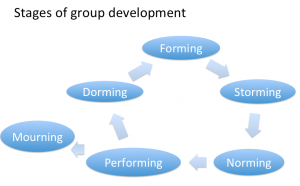
Stages of group development
Why you need a good storm in order to perform with a group.
We’ve all made the experience of having to work in groups. Sometimes it is fun, sometimes it is less fun. But you can actually influence how well group work is going to work out, and a first step is understanding that there are a couple on inevitable phases in group work that every group goes through before it reaches productive working mode. I’m going to talk you through the stages of Tuckman’s model of group development and point out the challenges and chances of individual phases.
Forming
When a new group comes together for the first time, they enter into the “forming” phase. In this phase, participants get to know each other and trust needs to be established. It is important for participants to feel accepted and liked, so everybody is on their best behavior and conflicts are avoided.
Storming
In this phase, participants are comfortable around each other, so they start expressing disagreements. Conflicts can develop, and power struggles emerge. Some teams never make it past this phase, which means that the team work basically fails. To overcome this phase, team leaders need to deal with conflicts and help participants resolve it.
Norming
Now the team manages to identify common goals and establish norms on how they will work together and what is acceptable behavior. Compromises are found and participants take on responsibilities for tasks.
Performing
After all the previous stages have been lived through, a team can reach the performing stage. Now work runs smoothly, roles are filled confidently but also flexibly. Most decisions are made within the team and there is no need for external guidance.
Performing teams can fall back into earlier stages if, for example, new participants join the group and challenge existing norms or roles. The team then goes back into the storming phase and needs to go through it, and the norming phase, before it is back to good performance.
The original model has later been expanded to include two more stages: dorming and adjourning.
Dorming
In this stage, the team gradually slides into a mode where it is satisfied by what has been achieved already and where new challenges are missing or not taken on head-on.
Adjourning
At the end of projects when a team dissolves, a sense of loss is experienced by team members who mourn the loss of their roles, the group, their tasks.
So how does it help to know about these stages of group development? Well, firstly if you are aware that they are part of the normal process, you might not be too shocked to find that your super nice team suddenly starts struggling when, for example, it moves from the forming to the storming phase. And once you are able to diagnose that, for example, after a period of very successful group work you have slipped into the dorming phase, you realize that this means that you might need new challenges to mix things up and come back into the performing stage. Also, conflicts are much easier to bear if everybody is aware that they are not personal, but that they are a necessary part of a group finding their working mode, and if they can therefore be used constructively to reach the working mode even earlier.
And these stages of group development do not only occur when you have a student group work on a project, or when you and your colleague form a working group on a new topic, they also occur in your lectures. Think about it – at first, students are curious about what is going to happen. Then they start testing you. If things work well, you establish ground rules together and move on to working productively together. If not, this is the phase where many lectures remain for most of the semester. So realizing they are testing you and it is possible to move on from there might help overcome the frustration that comes with the storming phase.
